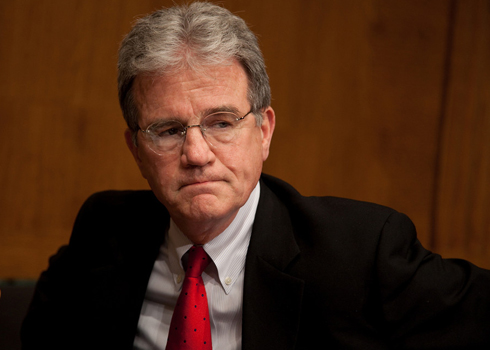Not since David Lee Roth left Van Halen has a defection augured so poorly for team success. On Tuesday, Sen. Tom Coburn (R-OK) told reporters he was stepping away from the Gang of Six negotiations — a bipartisan working group of senators putting together a plan to reduce the deficit and debt — over their inability to agree on entitlement spending cuts.
After a bit of confusion over Coburn’s status in these talks, his spokesman John Hart confirmed the departure in a statement, “He has decided to take a break from the talks.”
A source with knowledge of the negotiations says Coburn ultimately broke ranks after members of the group rejected his proposal to introduce a global cap on Medicare spending that would have cut $150 billion from current beneficiaries.
“The issue we have now is, over the last couple weeks Coburn has been slow walking this and it’s become clear that he’s not been negotiating in good faith,” the source said. “He came yesterday with demands that we make immmedate and deep cuts to current Medicare beneficiaries.”
Coburn did not attend the group’s Tuesday afternoon meeting, and Hart’s statement suggests he won’t make an appearance Wednesday either. Hart did not immediately respond to a request for comment on Coburn’s Medicare proposal.
This is the latest blow to the group’s efforts, and by far the most serious. Coburn is one of the Senate’s most conservative members, and one of the few Republicans whose commitment to small government is fairly well matched by his voting record. Yet, for the past several weeks, Coburn has put his reputation in conservative circles on the line by mixing it up publicly with the influential anti-tax advocate Grover Norquist over whether a long-term deficit reduction plan should include higher revenues.
As that fight played out the leaders of both parties openly undercut the group’s efforts. There were several reasons for that, not least of which is that the White House and Congressional leaders have taken up the issue directly in private negotiations led by Vice President Joe Biden. But on the GOP side, it was driven in part, no doubt, by Coburn’s willingness to flirt with the idea of supporting revenue increases.
“I mean, with all due respect to the gang of six, or any other bipartisan discussions going on on this issue, the discussions that can lead to a result between now and August are the — are the talks being led by Vice President Biden,” said Senate Minority Leader Mitch McConnell at his Capitol briefing a week ago.
His Democratic counterpart, Harry Reid, told his members recently not to sign on to the Gang of Six’s work or any other plan until the trajectory of debt negotiations becomes more clear.
With support from leadership slipping, the greatest hope for the group was that they reached agreement on a package that the members could sell to a significant number of members of both parties.
Aside from Coburn, the Gang of Six is comprised of Sens. Dick Durbin (D-IL), Kent Conrad (D-ND), Mark Warner (D-VA), Mike Crapo (R-ID), and Saxby Chambliss (R-GA).






